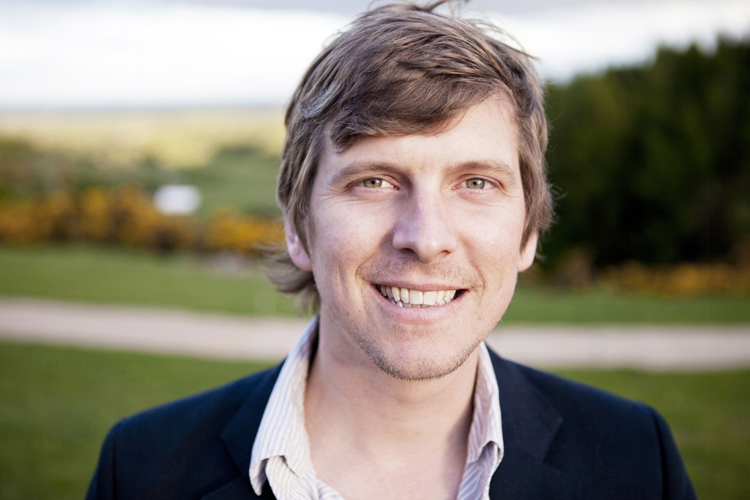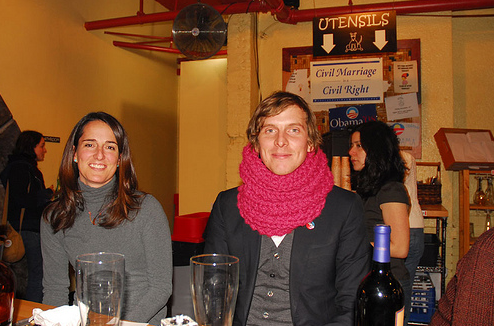Making Responsible Business a Reality: An Interview with Etsy’s Matt Stinchcomb
by Lisa Mastny | April 17, 2013

New Dream spoke with Matt Stinchcomb, Vice President for Values & Impact at the online marketplace Etsy, about his efforts to make the company—and the wider business community—more ecologically, socially, and economically responsible.
You’ve worn many hats at Etsy, but your current position is to coordinate “Values and Impact” for the company. Can you explain what this means?
My work tries to address two main questions. The first is, how do we work with all teams at Etsy to ensure that the company’s mission, vision, and values are integrated into the activities that we do every day. So this means looking at everything from who we’re buying milk from to who we do business with on a larger scale. The second question is, how do we most effectively use Etsy to maximize ecological, social, and economic value in the world? As a company, we’re in the business of “doing good,” so we want to figure out how we can use our business to train other businesses to build a lasting and fulfilling world.
How did you first get involved with Etsy? Do you have a background in business or the arts?
I was the original marketing person at Etsy—the first employee after the three founders. Before that, I was in a band (The French Kicks), so it’s not like I had a professional background in web development or even marketing. A few years after being hired, I moved to Germany to help with Etsy’s international expansion, and lived there for two years. After I moved back to the U.S., I took over marketing again to head up a new team on brands and social responsibility.
I think many Etsy shoppers aren’t really aware of just how “responsible” a company Etsy is (thanks in large part to your efforts). Can you talk a little about Etsy’s work in this area?
I learned pretty early on that most of what is billed as “corporate social responsibility” (CSR) is actually pretty bogus—it involves a lot of greenwashing and trying to project a good image. We wanted to be sure that Etsy was about being a good business at its core—that is, making the business be the agent for change. Real “responsibility” is about having actual impact, not simply atoning for bad things that you do.
A big problem is that CSR often becomes a siloed function of business, with only a few designated people paying attention to this work. At Etsy, we want to make it so every person, every team in the company, is doing it. So I collaborate with a small team of four who essentially serve as internal consultants to the company. In many ways, I’ve created my dream job.
I’m new to this world in a lot of ways. Like I said, I don’t have background in working for a mission-driven business. Actually, no one at Etsy was a business person, so we didn’t really know the rules, the status quo. We just knew that a lot of times, what was supposed to be the “right” way to do something felt awful. We want to reimagine commerce, how business is done, and to serve as a model for others.
What are some steps that you are taking to achieve this vision?
Right now, we’re limited by our own time available to address this. And our personal time is complicated by the fact that, as a planet, we don’t have much time to deal with some really big issues like climate change. So one of the things we’re asking at Etsy is, how can we maximize the company’s impact in the time we do have?
For instance, we’re trying right now to convert the Etsy offices to 100 percent solar power and are in the process of getting bids for this transition. But the bigger question we’re asking is, how do we help the 1 million small businesses on Etsy become solar powered? One idea is to offer incentives, like saying, if you switch to solar, we will feature you more prominently on the site.
 What are some of the challenges you face in your work?
What are some of the challenges you face in your work?
One of the best things about working for a company like Etsy is that I don’t have to justify why “doing good” is important. I can take a lead role and don’t have to provide the financial justification for, say, avoiding paper cups. But at the same time, the company is growing—we’re at 400 people now. A lot of our employees come from more traditional backgrounds and are used to business as usual. They may not know how to implement best practices in a workplace where they don’t only have to look at the economic impact of their decisions. It goes against years of training for people, and sometimes it takes time for people to “get” our unique business culture.
Another challenge is finding scalable solutions, especially as Etsy grows. We also need to get better at collecting data, so we can really measure the impacts of the actions we take. Data is the key to everything—it makes you accountable, and it makes others take you more seriously. We need some basic baseline data, such as what is the ecological footprint of the Etsy marketplace? What’s the impact of shipping second-day air versus other ways? Through the different options we provide, we want to help shoppers choose wisely.
As a company, how far do you feel like you need to go to create change? Can you really influence every supplier and every customer?
The reality is that we can’t depend on the government for things to change, so we have to use the power of business to encourage a sense of responsibility. But we also need to make sure that, as a company, whatever we’re encouraging people to do is also the easiest path for them to take. We need to break down barriers. And often it means starting small. I’ve made this my own personal mission. I feel like I have no choice but to devote my life to having a positive impact. And I have a bigger chance with Etsy than anywhere else. I have access to 50 million people—so the question is, how can I leverage that impact?
What are some ways that you envision doing that?
One of our major projects, which will eventually spin off, is OpenImpact.org. It’s still under development, but the goal is to have a platform where businesses that are doing innovative and responsible things can teach other businesses how to do those things. It’s focused on businesses like Etsy that have a community with an aggregate audience. We’re working with a lot of mid-sized tech companies that are community based, since they tend to be run by younger, more open-minded people and have the ability to reach a lot of people. We’re also looking at B Corps that are building networks or communities
We’re finding that there are a lot of people who want to do things in a different way. But they need information, and models. Ultimately, the best thing that Etsy can do is be successful—to make money. If we can prove that we can still return value to shareholders, then we’re showing that a different way is really, truly possible. And so far, we’re doing it.
You must be really busy. How do you find time to balance work and life?
Etsy is very focused on employee well-being and has developed a lot of indices to measure this. We’ve tried really hard to instill a “guiltless” culture so that, for example, fathers feel like it’s ok to take more than two days off after their child is born. Chad, the CEO, took six weeks off when he became a father. And I have a two-year-old, and another one on the way, so we’re well aware of the challenges of balancing family and work.
I try to leave at 6 p.m. every day and not work at home, but it’s hard because life and work are so connected these days. It’s hard to be present, mindful, and not looking at your phone. There’s also the expectation that e-mail is immediate. It dictates your day—you spend most of your time responding to messages and doing other peoples’ stuff. I’m trying to start a schedule where, on Fridays, I don’t have any meetings and only check my email once in the morning and once in the evening. The rest of the day, I’ll do things like walk in the woods, go to a museum—things that create space for strategic, big-picture thinking.
I’m trying to make this alternative Friday schedule a pilot program at Etsy, involving a few people across the organization. As a test, we divided them into three groups—one group had to take an hour-long walk a day and have tea together, the second had to set goals at the beginning of the day and only complete one task at a time, and the third could only check email three times a day. The email group really freaked out, because for a lot of them email provides guidance for the day, and they weren’t always sure what they should be working on.
How is the alternative Friday approach working out for you?
The pilot program is supposed to launch this week, so I’ll let you know how it goes! For me personally, to be honest, I’ve been unable to have a meeting-less Friday yet. But I really want to do this! There’s a world of inspiration and ideas out there. I really like the idea of a four-day workweek and then one day of self-improvement. My wife and I own some land upstate, and part of me really just wants to walk in the woods all day…but I would work too!
You’ve recently joined the board of New Dream. What drew you to New Dream, and what role do you see the organization playing in addressing the kinds of challenges you discussed above?
[Executive Director] Wendy Philleo contacted me out of the blue last year with questions about potential partnerships between Etsy and New Dream, and I immediately wanted to find out more about what you guys are doing. One of the things I’ve been working on at Etsy is Etsy Local, the idea of having a more local push and helping to create robust local marketplaces. Outside of work, though, I’m also interested in a lot other things that New Dream works on—seed libraries, tool libraries, time banking, the new economy movement, etc. It’s a great resource for people, so I’m excited to be involved!
Matt Stinchcomb is VP of Values & Impact at Etsy. He is also a musician, a screenprinter, and a budding photographer. He lives in Brooklyn, New York, with his wife and young son.

